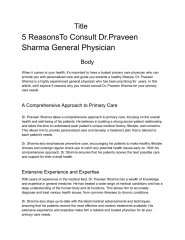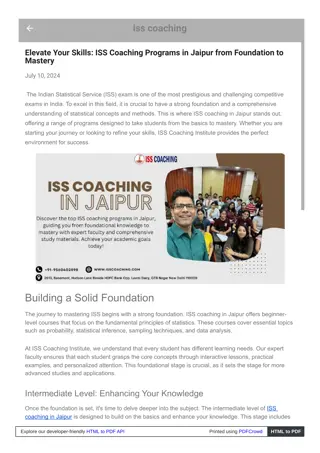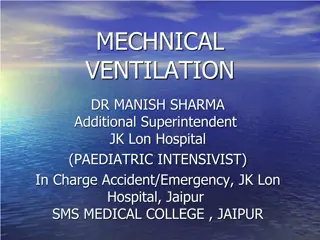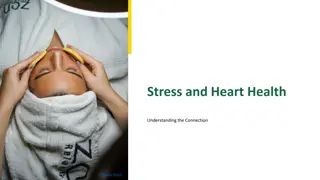Cardiologist In Jaipur-Dr Rahul Sharma
Angina Symptoms: Angina is a condition characterized by chest pain or discomfort caused by reduced blood flow to the heart muscle. Itu2019s often a symptom of underlying coronary artery disease, which occurs when the arteries that supply blood to the heart become narrowed or blocked by plaque buildup.nRecognizing the angina symptoms is crucial for prompt diagnosis and appropriate management. In this comprehensive guide, weu2019ll delve into the various symptoms of angina, its types, causes, risk factors, and management strategies.nn
Download Presentation

Please find below an Image/Link to download the presentation.
The content on the website is provided AS IS for your information and personal use only. It may not be sold, licensed, or shared on other websites without obtaining consent from the author.If you encounter any issues during the download, it is possible that the publisher has removed the file from their server.
You are allowed to download the files provided on this website for personal or commercial use, subject to the condition that they are used lawfully. All files are the property of their respective owners.
The content on the website is provided AS IS for your information and personal use only. It may not be sold, licensed, or shared on other websites without obtaining consent from the author.
E N D
Presentation Transcript
Angina Symptoms: A Comprehensive Guide By Dr. Rahul Sharma Angina Symptoms: Angina is a condition characterized by chest pain or discomfort caused by reduced blood flow to the heart muscle. It s often a symptom of underlying coronary artery disease, which occurs when the arteries that supply blood to the heart become narrowed or blocked by plaque buildup. Recognizing the angina symptoms is crucial for prompt diagnosis and appropriate management. In this comprehensive guide, we ll delve into the various symptoms of angina, its types, causes, risk factors, and management strategies.
Angina Symptoms Chest Discomfort: The hallmark symptom of angina is chest pain or discomfort. It s often described as a squeezing, pressure, heaviness, or tightness in the chest. The sensation may also be likened to indigestion or heartburn. The discomfort typically occurs behind the breastbone but can also radiate to the neck, jaw, shoulders, arms, or back. Shortness of Breath: Angina may be accompanied by difficulty breathing or shortness of breath, especially during physical exertion or stress. This symptom occurs due to the heart s inability to pump enough blood to meet the body s demand. Fatigue: People with angina often experience fatigue or weakness, even with minimal physical activity. This occurs because the heart muscle is not receiving an adequate supply of oxygen-rich blood. Nausea and Dizziness: Some individuals with angina may feel nauseous or dizzy, particularly when the condition is severe or prolonged. These symptoms can result from reduced blood flow to the brain. Sweating: Profuse sweating, especially in conjunction with chest discomfort, can be a sign of angina. Sweating may occur suddenly and without apparent cause.
Types of Angina Stable Angina: This is the most common type of angina and typically occurs during physical exertion or emotional stress. The symptoms are predictable and often relieved by rest or medication. Unstable Angina: Unstable angina is characterized by unpredictable chest pain that occurs even at rest or with minimal exertion. It may signal a more serious condition, such as an impending heart attack, and requires immediate medical attention. Variant (Prinzmetal s) Angina: This rare form of angina occurs due to coronary artery spasm, which causes temporary narrowing of the arteries and reduced blood flow to the heart. It often occurs at rest and can be associated with certain triggers, such as exposure to cold or stress.
Causes and Risk Factors Atherosclerosis: The buildup of plaque (a mixture of cholesterol, fat, and other substances) in the coronary arteries narrows the arteries and restricts blood flow to the heart. High Blood Pressure (Hypertension): Elevated blood pressure puts added strain on the heart and arteries, increasing the risk of coronary artery disease and angina. High Cholesterol: Elevated levels of LDL cholesterol (the bad cholesterol) can lead to plaque buildup in the arteries, contributing to coronary artery disease. Diabetes: Diabetes increases the risk of coronary artery disease and angina by damaging blood vessels and promoting atherosclerosis. Smoking: Tobacco use damages the blood vessels, accelerates the progression of atherosclerosis, and increases the risk of angina and heart disease.
Book an appointment with Dr. Rahul Sharma! To schedule an appointment with Dr. Rahul Sharma, a renowned cardiologist in Jaipur, for an evaluation of potential angina symptoms, please contact us at 6376993553. Dr. Sharma possesses extensive expertise in cardiovascular health and is dedicated to providing exceptional care to his patients.























